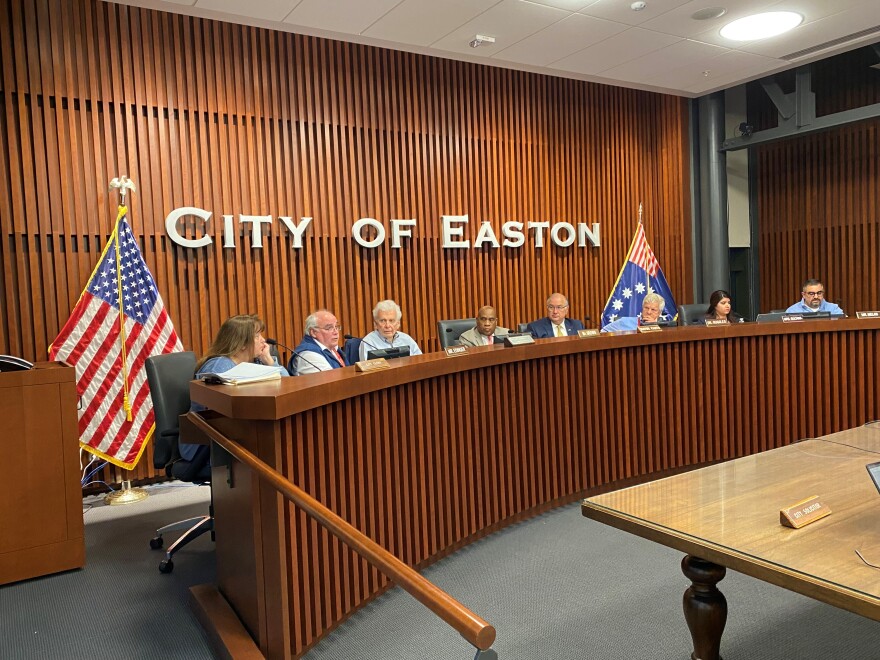EASTON, Pa. — A heated discussion on the sensitive nature of officially recognizing Muslim holidays via a resolution led Easton’s City Council on Wednesday to pass a measure to create an inclusive calendar honoring various religious celebrations.
During the debate, a resolution aimed at recognizing Muslim holidays morphed into a measure establishing a holiday celebration calendar that would feature various religions' festivities.
- Easton City Council member Taiba Sulta introduced a resolution to recognize Muslim holidays during Wednesday's meeting
- Council members and administrators debated the move, questioning the idea of promoting one particular religion's holidays
- The council passed a measure to establish an inclusive calendar featuring various religious holidays
Introduced by Councilman Taiba Sultana, the original resolution would have recognized and commemorated the month of Ramadan, along with Eid al-Fitr, which follows Ramadan.
Eid al-Fitr encompasses prayer, celebrations and acts of zakat, or charity — and Edi al-Adha, when the Hajj pilgrimage takes place and Muslims performs acts of zakat and friendship.
A more comprehensive calendar
But the discussion yielded establishment of a more comprehensive calendar, which is under development.
The resolution noted the importance of the holidays, especially Eid al-Adha, which “celebrates the story of the Abrahamic prophets Abraham and Ishmael,” and “connects Muslims to the other major Abrahamic faiths.”
It also noted the rise of Islamophobia throughout the country as motivating factors for the measure.
Sultana originally amended the resolution slightly, removing a suggestion for a Muslim holiday dinner held by the city and rewording an introduction, before the board discussed the matter.
Fellow council members didn't appear to oppose the idea behind the resolution. But some pointed out the city doesn't officially recognize other religions’ holidays, which they said could straddle the line of separating church and state, inviting lawsuits.
“I know there was some conflict, and some objections, but I think we did really well just to include other cultures and holidays to make it a more inclusive city.”Easton City Council member Taiba Sultana
Concern about language
Mayor Sal Panto Jr. said he was concerned about the resolution's language — in particular, a part that specified “the Muslim community is an essential part of the Easton community.” Panto said “all religious communities are an integral part” of Easton.
“I don’t know that we recognize any holidays that are religious," Panto said. "Our collective bargaining groups may; that’s because the unions have asked for things like Good Friday off or something like that.”
Sultana countered the initiative was specific to Muslim holidays, and said other religious groups would be welcome to introduce their own resolutions to recognize other holidays.
Panto also contested using Easton’s official social media accounts to commemorate Muslim holidays, saying those accounts were not used to recognize other religious holidays.
Council members went on to discuss the absence of religious holidays on the Easton city calendar, which predominantly highlights municipal meetings and sponsored events. They eventually agreed the two subjects should be separate.
A dynamic calendar
City Administrator Luis Campos noted the key administrative concern brought up during the meeting was “acknowledging a celebrations calendar, and not knowing which other celebrations to put on that calendar.”
“It was clear that Ramadan and some of the other Muslim holidays were to be on that calendar,” Campos said. “The problem is, which other celebrations do we place on that calendar?
"But at the end of the day, what I think we’re going to do is put a draft together, present it to council, and then as members of the public want something on there, they can go through council.”Easton City Administrator Luis Campos
"But at the end of the day, what I think we’re going to do is put a draft together, present it to council, and then as members of the public want something on there, they can go through council.”
Campos said the upkeep of the calendar, including community input, should be a “dynamic process that should never, it should constantly be discussed and be open.”
Sultana said the outcome of the debate was “great,” noting other cities, including New York, have made strides to recognize holidays including those noted in her resolution.
“I know there was some conflict, and some objections, but I think we did really well just to include other cultures and holidays to make it a more inclusive city,” Sultana said, adding Easton already is quite inclusive, but the resolution would help further that mission.
After the meeting, Panto specified the calendar would be purely educational, and not a suggestion of the city’s promotion of any religion or belief in particular.
“It needs to be inclusive,” Panto said. “You can’t just do it for one religion. I personally don’t think we should do it for any religion, but if we’re going to do it for one of them, we need to do it for all of them, so I think I came up with a solution that works.”


